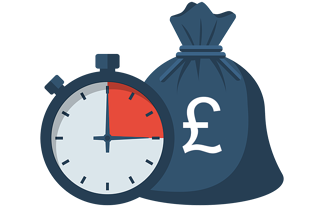More and more businesses are turning to online payments for maximum speed, convenience and security. Compared to trusty traditional methods, tech-enabled transactions deliver on many levels.
One of the most popular methods is the Faster Payments scheme, a simple and quick way to send and receive funds electronically. Billions of transactions are completed this way every year, from buying online groceries to paying back the £20 your friend lent you on a night out.
And their power can extend beyond personal use to simplify how your business makes and receives payments.
Here we explore what they are, how they work and why they could be the perfect fit for your business.
What Are Faster Payments?
 The Faster Payments (FP) scheme offers 24/7 near real-time payments between 21 UK bank and building societies. Accessible to 52 million account holders, it allows electronic payments to be made online, over the phone, in branch or through self-service kiosks.
The Faster Payments (FP) scheme offers 24/7 near real-time payments between 21 UK bank and building societies. Accessible to 52 million account holders, it allows electronic payments to be made online, over the phone, in branch or through self-service kiosks.
Designed to speed up the process of sending money, it significantly reduces payment times between bank-to-bank transfers. It acts as the default service for all internet and mobile banking activity, with transactions typically clearing instantly but sometimes within up to two hours.
Perfectly suited to making payments such as bills, online purchases and one-off transfers, as well as supplier invoices, they could be an ideal solution for your business.
Explore the Facts and Figures
When it launched in 2008, FP was the first truly 24/7, 365 days a year real-time payment system in the world. It was also the first new system in the UK for 20 years.
In December 2014, 100 million payments were processed in a single month for the first time. And in July 2015, the scheme processed its 5 billionth payment.
With over nine billion Faster Payments made to date, its popularity shows no sign of waning:
- In 2018, over 2 billion payments were made, breaking the record for the highest amount of payments processed in a single year
- In total, there were 387 million more payments processed than in 2017, an increase of 23%.
- The value of transactions increased by 22% in 2018 to £1.7 trillion
- Q2 of 2019 saw 594 million payments processed, a 19% increase from Q2 2018
Types of Faster Payments
The FP scheme is made up of four different payment methods:
-
1. Single Immediate Payments (SIPs)
The most common type, customers initiate these as one-off payments, either via mobile, online or phone banking, or in branch. Payments can be sent 24 hours a day seven days a week, and the limit is usually up to £250,000 per transaction, subject to individual bank limits.
The money is usually available in the receiving customer’s account instantly, although the process can sometimes take up to two hours. The sending bank receives a response from the Faster Payments infrastructure within 15 seconds, confirming whether the payment has been accepted or rejected. If it’s rejected, the receiving bank will provide a reason.
If there is confusion over the identity of the sender, the banks will need to perform extra security checks, which may delay payment.
2. Forward-Dated Payments
Forward-dated payments are one-off payments sent and received on a pre-arranged date, set-up by the customer in advance. Typically used to pay bills and rent, customers can initiate forward-dated payments with their bank online, using a mobile device, over the phone or in a branch.
Like SIPs, up to £250,000 can be sent per transaction, 24 hours a day, seven days a week. It’s worth noting though that although forward-dated payments can be sent at weekends and on Bank Holidays, some banks and building societies will only process incoming payments on working days.
3. Standing Orders
Standing Orders are recurring payments that pay a set amount to the same recipient on regular dates, for example the first day of the month. They can be set up via mobile banking, over the phone or in branch.
With the same £250,000 transaction limit, it’s not possible to guarantee the exact time the payment will arrive in the receiver’s account once sent. However, around 90% of Standing Orders payments are sent by 6am the following working day.
4. Direct Corporate Access
This is a specialist service for business customers allowing them to send payment messages directly to the Faster Payments service in the form of bulk files. Available 24 hours a day, these are transmitted to the receiving customer on the same day.
Payment files are sent using a secure-IP solution, much like Bacs payments use Bacstel-IP. And users can access bespoke, accredited software solutions to automate and streamline the process.
Not all banks and building societies offer Direct Corporate Access but may have an alternative available to their customers.
How Do Faster Payments Work?
Offer FP as an option for your customers and they can pay you via their bank’s website, on their mobile banking app, via telephone banking, or at the bank branch itself. A convenient method that will save them time and hassle, positioning you as a helpful partner.
As a business, you can also take advantage of its convenience by using it to pay your own suppliers. Although most big name banks and building societies accept Faster Payments, it’s worth checking that yours does via a handy sort code checker.
If you want to pay £2000 to one of your suppliers, here’s how the process works:
- Instruct your bank to make the Faster Payment, either online, over the phone or in branch
- The bank will verify your identity, usually using a password
- Provide your supplier’s sort code and account number, along with a payment reference to appear on your supplier’s bank statement
- Your bank will check you have enough funds before making the payment. If the bank is unsure of your identity, it will hold the payment and perform additional checks
- Once these checks are complete, your bank will forward the details to your supplier’s bank
- This receiving bank checks that the account number is valid and informs the Faster Payments service that it’s accepted the payment
- Faster Payments then credits the receiving bank with the funds
- Your bank will inform you that the transaction is complete
- Your invoice is paid and your supplier is happy
Enjoy the Benefits of Faster Payments

When your business uses FP to make and accept payments, you’ll enjoy several benefits:
– Speed
One-off payments can be processed quickly at the touch of a button. You have the reassurance that your payment has been made and that your invoice has been paid.
And because the system is available 24/7 you don’t have to remember to make a payment within working hours. It also gives your customers more flexibility to pay you when it’s most convenient.
This payment processing efficiency leads to real-time cash flow visibility and a simplified accounting system. When linked to streamlining software, you’ll have a clear overview of who’s paid what and when, and how much you still owe.
– Convenience and flexibility
All parties who use the Faster Payments service can tap into maximum convenience. Outstanding payments can be made on the go with a few taps on a mobile app, whatever the time of day.
Payments can even be made to a mobile number through Paym which was introduced in 2014. This allows people to transfer money to contacts without needing to know their bank details.
– Security and reliability
The Faster Payments scheme is only accessible to banks and building societies that meet strict security requirements. Any user who falls victim to fraud is protected from losses caused by unauthorised payments.
Faster Payments vs Bacs and CHAPS
Faster Payments shouldn’t be confused with two other automated payments systems: Bacs and CHAPS. They all facilitate the transfer of funds between bank accounts but operate in significantly different ways.
Bacs is the organisation which oversees Direct Debit and Direct Credit. A Direct Debit is a flexible, reliable way to collect recurring payments with money transferred from one account to another on set dates. Direct Credit, often referred to simply as Bacs, is a way to pay salaries directly into bank accounts.
There are several differences between them and Faster Payments. First, both Direct Debit and Direct Credit have a ‘set it and forget it’ functionality. For instance, once a Direct Debit mandate has been completed authorising a business to take regular payments, the customer doesn’t need to take any more action. FP requires them to remember to make each individual transaction, adding to their admin list.
They may not be as speedy, typically take three working days to clear, but Bacs payments are covered by a unique set of safeguards, the Direct Debit Guarantee. This protects users from the rare occasions when a payment error is made, giving a full and immediate refund.
CHAPS does guarantee same-day payment, provided the instruction is received by 2pm, but comes at a cost: £25 per payment. Used mainly for high-value transactions that exceed the £250,000 FP limit, it’s only free for some premium account holders.
Faster Payments are a rapidly growing preferred payment option to make quick, convenient transfers. For one-off payments and ad hoc invoices, they’re a reliable and efficient way to streamline your business’ accounting process while boosting customer satisfaction levels.
Which Banks Support Faster Payments?
When it comes to supporting faster payment methods, most major UK banks support them including Santander, NatWest, Barclays and HSBC. Initially, when Faster Payments were first introduced original members were the likes of Lloyds TSB, Nationwide Alliance Bank, The Co-Operative Bank and more.
How Can Faster Payments Be Used Fraudulently?
Fraudsters will make use of Faster Payments to act as another entity and send communications to individuals and businesses in a bid to trick them into sending payments to them. Those seeking to commit fraud through Faster Payments are finding it easy to obtain information through emails and social media accounts, which often provide vital information to assist their fraudulent activity.
Set Up Secure Faster Payments
FastPay provides advanced direct debit payment solutions for a number of businesses in a wide range of sectors across the United Kingdom. To get started with fast payments for your business, get in touch with a member of our team online or by calling us on 0161 737 5290.












